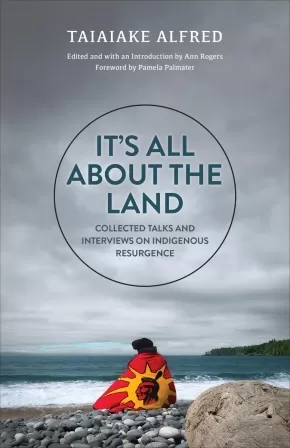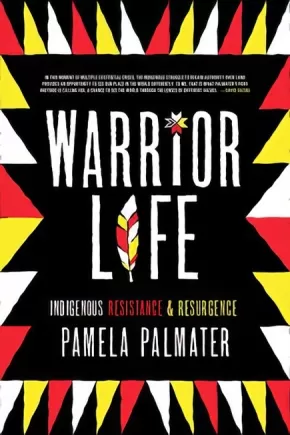Pamela D. Palmater
Dr. Pamela Palmater is a Mi’kmaq lawyer from the Eel River Bar First Nation in northern New Brunswick. She has two children, Mitchell and Jeremy, and a large extended family. Currently, she holds the position of Associate Professor and Chair in Indigenous Governance in the Department of Politics and Public Administration at Ryerson University. Pamela has worked for the federal government on Indigenous legal and governance issues, and has held several director positions at Indian and Northern Affairs Canada.
She completed her doctorate in the Science of Law at Dalhousie University Law School in 2009. She holds a Master of Laws from Dalhousie University in Aboriginal Law, a Bachelor of Laws from the University of New Brunswick, and a BA with a double major in Native Studies and History from St. Thomas University in New Brunswick.
She has published articles related to Aboriginal and treaty rights and has her own website dedicated to these issues. She has specialized in Indigenous identity issues, which include Indian status, band membership, and self-government citizenship and traditional Indigenous citizenship.
She is active in the Indigenous community, volunteering as a board member of Native Child and Family Services Toronto as well as ongoing work with First Nations in Ontario. She regularly appears as a commentator on APTN and has appeared before the House and Senate as an expert witness on legislation affecting Indigenous peoples.
Books (3)
Synopsis:
Beginning with an historic overview of legislative enactments defining Indian status and their impact on First Nations, the author examines contemporary court rulings dealing with Aboriginal rights and the Canadian Charter of Rights and Freedoms in relation to Indigenous identity. She also examines various band membership codes to determine how they affect Indigenous identity, and how their reliance on status criteria perpetuates discrimination. She offers suggestions for a better way of determining Indigenous identity and citizenship and argues that First Nations themselves must determine their citizenship based on ties to the community, not blood or status.
Additional Information
280 pages | 6.00" x 9.00"
Synopsis:
Illuminating the First Nations struggles against the Canadian state, It’s All about the Land exposes how racism underpins and shapes Indigenous-settler relationships. Renowned Kahnawà:ke Mohawk activist and scholar Taiaiake Alfred explains how the Canadian government’s reconciliation agenda is a new form of colonization that is also guaranteed to fail.
Bringing together Alfred’s speeches and interviews from over the past two decades, the book shows that Indigenous peoples across the world face a stark choice: reconnect with their authentic cultures and values or continue following a slow road to annihilation. Alfred proposes a radical vision for contesting and confronting the ongoing genocide of the original peoples of this land: Indigenous Resurgence. This way of thinking, being, and practising represents an authentic politics that roots resistance in the spirit, knowledge, and laws of the ancestors.
Set against the historic arc of Indigenous-settler relations in Canada and drawing on the rich heritage of First Nations resistance movements, It’s All about the Land traces the evolution of Indigenous struggle and liberation through the dynamic processes of oratory, dialogue, action, and reflection.
Reviews
"It is Taiaiake’s call to face the uncomfortable truths of colonization and the impacts it has had on our Nations, families, and individuals that makes his work stand out. As his work is such a challenge to the current unjust status quo, it has been both embraced and rejected. This is a clear sign that he is on to something" — Pam Palmater, from the Foreword
“It’s All About the Land is a long-awaited, vital contribution and is an essential reading for anyone who wants to understand the injustices Native people live under and what we should be doing about it.” — Grand Chief Kahsennenhawe Sky-Deer, Mohawk Council of Kahnawà:ke
“Taiaiake Alfred is a thought shifter who builds fires with his words. Anyone who cares about Indigenous issues and craves to be jolted into action should read this book -- a real counter narrative to the status quo.” — Chelsey Luger, Lakota and Anishinaabe, author of The Seven Circles: Indigenous Teachings for Living Well
“It’s All About the Land takes mainstream assumptions about reconciliation as seen and processed through a colonial filter and turns them on their head. Insightful, informative, and deeply thoughtful, this book will have you thinking differently about decolonization and what reconciliation really stands for. Ultimately, it asks all of us to do and be more.” — Toula Drimonis, writer, columnist, and author of We, the Others: Allophones, Immigrants, and Belonging in Canada
“Some may be surprised, given my position and our respective philosophical world views, that I count Taiaiake as a friend, but his work forces me to scrutinize and constantly question my actions and those of my government so as not to reproduce the horrific social experiment that has devastated Indigenous peoples.” — The Honourable Marc Miller, Minister of Crown-Indigenous Relations
Educator Information
This book challenges conventional thinking about reconciliation. Renowned Kahnawà:ke Mohawk activist and scholar Taiaiake Alfred argues that reconciliation is another form of colonization and instead proposes Indigenous Resurgence as a radical vision for contesting and confronting the continuing genocide of the Original Peoples.
Contents
Foreword: The Battle to Decolonize Ourselves Inside and Out
Pamela Palmater
Introduction
Ann Rogers
Wasáse Redux
June 2005, TV Ontario
From Noble Savage to Righteous Warrior
March 6, 2010, Vancouver, BC
The Psychic Landscape of Contemporary Colonialism
November 9, 2011, Ottawa
Practical Decolonization
April 9, 2012, Kingston, ON
Warrior Scholarship
March 18, 2013, Victoria, BC
Constitutional Recognition and Colonial Doublespeak
November 27, 2013, Melbourne, Australia
On Being and Becoming Indigenous
November 28, 2013, Melbourne, Australia
Reconciliation as Recolonization
September 20, 2016, Montreal, QC
From Red Power to Resurgence
November 2, 2018, Vancouver, BC
Rebuilding the Fire: In Conversation with Pamela Palmater
July 5, 2019, Warrior Life Podcast
Ronón:kwe
January 19, 2021, The Mythic Masculine Podcast
Rooted Responsibility
March 2021, Victoria, BC
You Can’t Decolonize Colonization
September 16, 2022, The Decolonized Buffalo Podcast
Afterword: Wa'tkwanonhwerá:ton
Taiaiake Alfred
Bonus Track: The Four Intuitions
April 20, 2003, TV Ontario
A Note on the Sources
Index
Additional Information
304 pages | 5.50" x 8.50" | 11 b&w illustrations | Paperback
Synopsis:
In a moment where unlawful pipelines are built on Indigenous territories, the RCMP make illegal arrests of land defenders on unceded lands, and anti-Indigenous racism permeates on social media; the government lie that is reconciliation is exposed. Renowned lawyer, author, speaker and activist, Pamela Palmater returns to wade through media headlines and government propaganda and get to heart of key issues lost in the noise.
Warrior Life: Indigenous Resistance and Resurgence is the second collection of writings by Palmater. In keeping with her previous works, numerous op-eds, media commentaries, YouTube channel videos and podcasts, Palmater’s work is fiercely anti-colonial, anti-racist, and more crucial than ever before.
Palmater addresses a range of Indigenous issues — empty political promises, ongoing racism, sexualized genocide, government lawlessness, and the lie that is reconciliation — and makes the complex political and legal implications accessible to the public.
From one of the most important, inspiring and fearless voices in Indigenous rights, decolonization, Canadian politics, social justice, earth justice and beyond, Warrior Life is an unflinching critique of the colonial project that is Canada and a rallying cry for Indigenous peoples and allies alike to forge a path toward a decolonial future through resistance and resurgence.
Reviews
“In this moment of multiple existential crises from climate change to species extinction, ocean degradation, toxic pollution and so on, the Indigenous struggle to regain authority over land provides an opportunity to see our place in the world differently. To me, that is what Palmater’s fiery rhetoric is calling for, a chance to see the world through the lenses of different values.” — David Suzuki
“As governments try to pull the wool over the public eye by suggesting contemporary colonial acts are best for Indigenous peoples, Palmater helps us see the wrongdoing so we can become informed and be respectful change allies. Read this book to see the many faces of colonialism and to learn how truth, justice, and respect can defeat it.” — Cindy Blackstock, First Nations Child and Family Caring Society of Canada
Educator Information
Table of Contents
Foreword by Niigaanwewidam James Sinclair
Harper’s Gone, Now It’s Time to Look Within
The Worst Thing That Could Happen Is A First Nations Minister of Indian Affairs
Will We See Real Nation to Nation Respect With Trudeau?
Evidence of Good Faith Lacking in Trudeau’s Indigenous Agenda
Why Is Trudeau Government Opposing Charter Equality for Indigenous Women?
PM Trudeau’s Nation to Nation Relationship Disappeared with Empty Budget Promises
Trudeau’s Dance of Deception on Indigenous Rights
Trudeau’s Forked Tongue Reconciliation At UN
Indigenous Issues Disappear Slowly from Election 2019
Canada’s Ongoing Racial Discrimination Against Indigenous Women and Children Discussed at United Nations
Lethal Impact of Racism on Indigenous Health
Overincarceration Of Indigenous Peoples Nothing Short of Genocide
First Nations Water Crisis Problems A Crisis of Canada’s Own Making
Saskatchewan: The Land of The Living Skies and Lethal Racism
Justice for Our Stolen Children Camp
How Canada Turned A Blind Eye to The Suicide Crises In First Nations
Don’t Forget the Racist Canadians Behind the Racist Systems
The Ongoing Legacies of Canadian Genocide
Sexualized Genocide
Corporate Conquistadors Rape Indigenous Lands and Bodies
Bill S-3 Amendments to The Indian Act and the Never-Ending Battle for Equality for Indigenous Women
What You Need to Know About Sharon McIvor’s UN Victory on Indian Status
The People Left Behind by Trudeau’s Promised Nation to Nation Relationship (Co-Authored with Sharon McIvor)
Federal Budget 2019 Indigenous Women & Children Left Behind Again
Public Inquiry Needed to Address Sexualized Violence in Policing and Corrections
Why Canada Should Stand Trial for Tina Fontaine’s Murder
Justice System Still Not Protecting Indigenous Women and Girls
Missing and Murdered: Canada’s Genocide Cover-Up
Transitional Justice Plan Needed to End Genocide in Canada
Bill C-92’s Indigenous Child Welfare Act More Pan-Indigenous Legislation That Risks Continuing the Status Quo
Bill C-91 An Act Respecting Indigenous Languages: More Hollow Reconciliation
Canada’s Criminalization of The Indigenous Tobacco Trade
Cannabis Legalization Ignores First Nations
NAFTA 2.0 – Time to Get It Right or Kill It
Bill C-51, Anti-Terrorism Act, Testimony and Questions at Senate Committee on Public Safety and National Security
RCMP Invasion of Wet’suwet’en Nation Territory Breaches Canada’s Rule of Law
Killer Whales, Trans Mountain Pipeline and The Public Interest (Part 1)
It’s Up to Indigenous Environmental Groups to Protect the Public Interest (Part 2)
Clearing the lands has always been at the heart of Canada’s Indian Policy
The blockades no one talks about devastate Indigenous economies
The Liberals Plans for Indigenous Reconciliation are Just Beads and Trinkets
Abolishing the Indian Act Means Eliminating First Nations’ Rights
The Source of Our Power Has Always Been in Our Peoples – Not Voting in Federal Elections
Indigenous Rights are Not Conditional on Public Opinion
Reconciliation with Indigenous Peoples in Universities and Colleges
True Test of Reconciliation: Respect the Indigenous Right to Say No
The Indigenous Right to Say No
A Modern Treaty to Save Our Peoples and the Planet
Social Conflict Inevitable in Decolonization Battle
Indigenous Women Warriors are the Heart of Indigenous Resistance
Wet’suwet’en: a wake-up call for Canada
References
Index
Additional Information
272 pages | 6.00" x 9.00"









